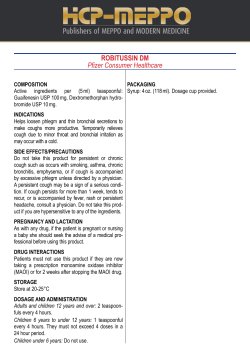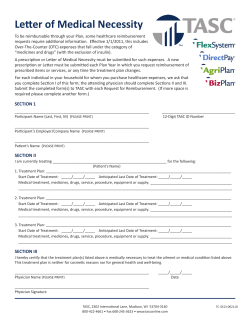
Document 58202
TIPS FOR OVER-THE-COUNTER COLD & FLU MEDICINES OTC medicines do not cure colds or flu, but they can ease your symptoms and help you feel better. Remember, they are serious medicines. n Read and follow the directions on the labels carefully. n Check age recommendations on children’s products. The Food and Drug Administration (FDA) cautions that cough and cold medicines NOT be given to children under 4 years of age, unless recommended by a health care provider. n Know what’s in your OTC medications. Ingredients used for fever and pain like aspirin, acetaminophen (Tylenol), and ibuprofen (Advil, Motrin) are included in other OTC and prescription products, so check the labels and make sure you aren’t taking multiple medicines with these ingredients. n Do not give aspirin or products containing aspirin to persons younger than 20 years of age. n Pregnant women should not use aspirin or ibuprofen (Advil, Motrin). Product List Symptoms Treated Please read and follow label directions carefully. For children’s products, observe the age limitations. Nasal decongestants and combinations n Pseudoephedrine* Tabs 30 mg, 60 mg (Sudafed) Children’s Liquid 30 mg/5ml n Phenylephrine Tabs 10 mg (Sudafed PE) Stuffy Nose Runny Nose Cough 4 4 Aches, Fever Sore Throat 4 4 4 n Children’s Dimetapp Cold & Cough Liquid 4 n n Saline Nose Spray (Ocean) Oxymetazoline Nose Spray 0.05% (Afrin) (do not use more than 3 days in a row) 4 4 Cough suppressants and expectorants n Guaifenesin Syrup 100 mg/5 ml (Robitussin) Long-Acting Tabs 600 mg (Mucinex) n Guaifenesin+Dextromethorphan Syrup (Robitussin DM)** Tabs (Mucinex DM) n Guaifenesin+Pseudoephedrine* Liquid, Tabs (Mucinex D) n Cold and Flu Medicines Dextromethorphan Syrup—12 hr formula (Delsym)** 4 GET THE FACTS! 4 4 4 4 4 Cold and flu season is here! 4 Pain relievers and fever reducers Acetaminophen Tabs 325 mg, 500 mg (Tylenol) Children’s Suspension 160 mg/5 ml, Chews, 80 mg n Ibuprofen Tabs 200 mg (Advil) Children’s Liquid 100 mg (Children’s Advil) n Throat Lozenges (Ricola), Throat Spray (Cepacol) 4 4 4 4 n 4 4 4 4 4 * Please ask pharmacy staff for assistance with products containing pseudoephedrine. **Dextromethorphan (DXM) has become a popular medication of abuse, especially among adolescents. For more information, please see www.doseofprevention.org. 00868-000 (REV. 8-13) FOR SPANISH USE -001 Be prepared with over-the-counter (OTC) cold and flu medicines FACT You can help prevent colds and seasonal flu. • Get a flu vaccine. The Centers for Disease Control recommend a yearly flu vaccination for everyone 6 months and older. • Wash your hands often to prevent getting or spreading cold and flu germs. Cough or sneeze into the bend of your elbow. • Eat healthy foods, exercise regularly and get enough sleep. FACT Taking care of yourself when you have a cold or flu can help you feel better. • Get lots of rest and drink plenty of fluids. Warm water, herbal tea, or clear broth soup can help relieve congestion. • Nonprescription, over-the-counter (OTC) medicines may help to relieve uncomfortable symptoms like cough, stuffy or runny nose, aches and pains, or fever. • Treat each symptom separately and avoid combination or “multi-symptom” remedies unless needed. See the list of OTC medicines on the other side of this brochure. • When ill, take care not to expose others. For any flu-like illness, stay home for at least 24 hours after fever is gone. FACT Antibiotics are not for colds or flu. Rest, fluids, and TIME are key elements for taking care of colds and flu. These illnesses are caused by viruses. Antibiotic medicines won’t help because they kill only bacteria, not viruses. Taking antibiotics when they are not warranted can be harmful and increases your chances of being infected by resistant bacteria that antibiotics cannot kill. Antibiotics can also cause side effects such as stomach upset, diarrhea, and vaginal infections. Know when Antibiotics Work Illness Cold Flu Chest Cold healthy adults & children) (otherwise Sore Throat (except Strep) Runny Nose (green or yel low mucus) Usual Cause Antibiotic Virus Bacteria Needed? ✓ ✓ No ✓ No ✓ No ✓ No ✓ No No Middle Ear Fluid (otitis media with effusion) Adapted from: CDC/FDA Campaign—Get Smart: Know When Antibiotics Work The information presented here is not intended to diagnose health problems or take the place of professional medical care. If you are pregnant or have persistent health problems or further questions, please talk with your physician or health care provider. FACT Some symptoms can last for 2 weeks or more following a cold or flu. • Fever and sore throat generally improve within 4–5 days, and most people feel better within a week. • Cough and nasal discharge can last 2 weeks or longer. • Children’s symptoms can last up to 3 weeks. Call Kaiser Permanente if you have: • Trouble breathing, wheezing or tightness in your chest. • A fever of 100.4°F or higher for three days or more with a stiff neck, severe headache, or rash. • Coughed-up mucus that is bloody. • Severe ear pain, sudden hearing loss, or discharge from the ear. • A very sore throat and a hard time swallowing. • Fever that goes away then comes back after 2–3 days. • A child with shaking chills with cough or nighttime cough spasms. • A deep cough with lots of mucus or a cough that lasts more than three weeks. Note that dry, hacking coughs can last several weeks after an illness caused by a virus. It is also common to have yellow or green mucus. Colored mucus does not necessarily mean you need antibiotics. Remember that antibiotics are only useful for infections caused by bacteria. Visit kp.org/flu for helpful advice on preventing and treating seasonal flu.
© Copyright 2025





















